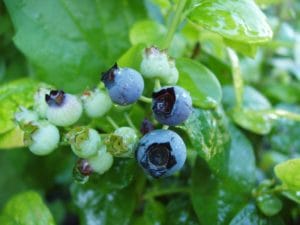Winona Post (MN)
By Emily Buss
Sustainable living is becoming an increasingly popular trend in the United States. Defined as the desire to take less from Mother Earth and reduce one’s carbon footprint, sustainable living is an eco-friendly way to live life to the healthiest, according to its proponents.
Organic farming goes hand in hand with sustainable living. Organic farmers do not use synthetic fertilizers and pesticides in an effort to grow natural and healthy products. In Minnesota, 650 farms are certified organic, most of which are right here in the southeastern corner.

Across Interstate 90, away from the speeding cars and out of range of truck noises, Jim Riddle and his wife, Joyce Ford, are quietly tending to their four-acre organic perennial fruit farm, Blue Fruit Farm, on Wiscoy Ridge Road. For the last four years, the couple—and longtime organic vegetable farmers—have been harvesting blueberries, elderberries, black currants, blue plums, serviceberries and aronia.
The couple, along with the help of local organic farmer Diane Leutgeb-Munson, opened up their farm in the valley Thursday to more than 100 eager agricultural enthusiasts from around the region to participate in a field day sponsored by Midwest Organic and Sustainable Education Service (MOSES).
Riddle gave attendees a tour of their massive gardens and showed how to propagate new elderberry plants by cutting and reusing their stems.
“This was a great way to teach and engage everyone on ways to grow their own food by using what you already have,” Riddle said.
During another presentation, Ford showed a group of growers how to test pH levels in the soil to grow a great crop of blueberries.
“Blueberries are known for needing a more acidic type of soil to grow and Joyce did a great job of teaching everyone how to make sure the soil was right,” Riddle said.
Tending to soil and mulching the ground is an important step in making sure the crops will grow properly. Riddle and Leutgeb-Munson showed participants how to lay mulch with a tractor in preparation for planting.
Riddle and Ford also gave tours of their eco-friendly home and showed off their solar electricity panels and wind generator.
They also showed participants how to cook the berries. Blueberries and elderberries were smashed into a deep purple sweet juice. Black currants were eaten by right off the plant, and also simmered into a thick jam for tasting.
“We are fortunate to live in such a vibrant part of Winona and be involved in great alternative production practices,” Riddle said.
Combating bugs
Organic farms are most notably differentiated from other farms by the lack of chemicals used on their plants. Synthetic pesticides and fertilizers are commonly used throughout the world as a means to combat the invasion of insects and other creatures. But on organic farms, chemicals are avoided at all cost, leaving crops vulnerable to bug infestation.
This past week, the Minnesota Department of Agriculture released a statement confirming the discovery of a new fruit fly in parts of the state. The spotted wing drosophila (SWD) is said to be an invasive species of Asian origin that looks similar to other fruit flies. They are most often found when the fruit is harvested — small white maggots appear.
At the University of Minnesota Outreach Extension, Riddle said he has been working with colleagues to find out more about the pesky fly.
“We have been looking into what strategies people have found to be effective,” Riddle said. “We haven’t found them (the flies) here in Winona but a woman from Decorah, Iowa, did say at the field day she found them in her raspberries.”
Because his farm is in the valley, Riddle said, he has a protection plan unlike others that is keeping his crop safe.
“Our farm is surrounded by native prairie plantings and woodlands,” Riddle said. “We have a lot of control on things like birds, frogs and dragonflies that help keep some of these pests in check.”
Get educated
Since starting the Winona Farmers Market more than two decades ago, Riddle has been constantly changing and adapting to the ways of organic farming and sustainable living. Organic farming is now regulated by the U.S. Department of Agriculture with specific rules farmers must adhere to.
“This isn’t a patchwork kind of organization anymore,” Riddle said. “There are a lot of standards and requirements farmers have to understand before they can just start growing. There are groups like MOSES that focus on teaching others how to organically farm the right way and there are a lot of resources available that didn’t used to be.”
Each year, Riddle attends the yearly MOSES conference in La Crosse to consult with organic farmers from across the nation.
“Conferences like this help to show that there are other lifestyle choices and you don’t have to be on a track and sit behind a monitor,” Riddle said. “There are ways to make more environmentally sound decisions.”
Each day, more and more Americans are choosing to buy organic. Products labeled “USDA 100 percent Organic” may cost more at the register, but they may be safer for the body.
“Winona is a wonderfully supportive community and the local co-op is a great place to find organic foods,” Riddle said. “This area is a hot spot for organic agriculture and there are a lot of people involved in it.”
For more information about MOSES, visit the website: http://www.mosesorganic.org/

